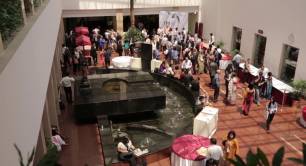New kid on the block
In the bowels of Coin St Neighbourhood Centre on the south bank of the Thames, a new social enterprise conference was born.
It’s pretty hard to elbow your way into the social enterprise conference calendar. Between the glitziness of Skoll, the buzz of the Social Enterprise World Forum and successive Sankalps, SOCAPs and anything else beginning with an ‘s’, trying to muscle your way in and get people to give you a chance is pretty tough. Well done then Lily Chong from Fourth Sector for being fearless enough to try. With experience of running media conferences for Informa, this event grew out of a number of social enterprise meet-ups that Chong ran over the summer.
As the website for the event describes it: “Our conferences…take a bottom up approach to give established and would be social entrepreneurs the essential knowledge, contacts and networking opportunities to excel in their social mission and their enterprise.” This conference made for a pretty decent introduction to social enterprise for those new to the sector. Calling your event ‘Social Enterprise Conference’ also had a does-what-it-says-on-the-tin ring to it.
Suffice to say with this conference, if you had no knowledge of social enterprise, you could get a really decent grounding of the subject in the space of a day. The keynote speech was delivered by self styled ‘Barefoot Entrepreneur’ Robert Ashton, offering advice for those thinking of entering the sector. He was followed by the high-spirited Robert Foster of Red Ochre (pictured above) who even started with an attempt to entice the audience into a dissection of the meaning of the term ‘social enterprise’. When he wasn’t demanding answers from shy audience members who’d made eye contact with him and high fiving those who came up trumps, a good grounding in the pros and cons of different legal statuses were explored – again, pretty handy if you were just setting out on your social enterprise journey.
Amongst the successive speeches at the conference, being reminded of some of the heart warming work being done in the social enterprise world often comes as blessed relief. This came in the form of Jeremy Hime relating what Creative Homes do – sending artists into stressed out homes to get kids to adopt simple good habits such as toilet training or teeth brushing through playing games. They do this for families that are finding it hard to cope with parenting.
Hime was there to relate what he had learned about measuring impact. The venture had faced many challenges, not least of which was 80% of families they’d worked with not having English as their first language, making it hard for them to articulate if and how the experience was useful. They had to get creative, coming up with a workbook for families to use, with illustrations of things like ‘stress thermometers’ for families to feed back on. Hime advised anyone trying to measure their impact to keep asking questions of themselves. “Have we got our measurements right? Are we achieving our mission? Is it working best for the family?”
More building blocks for your social enterprise followed. A who’s who of representatives from several social investors took the stage including Big Issue Invest and CAF Venturesome. Charlotte Borger of Divine Chocolate offered insight into marketing and Lucy Findlay delivered transparency about using the Social Enterprise Mark.
What really seemed to engage the audience was a turn by Alistair Heron of Colne Housing Society who told a cautionary tale of integrating a small social enterprise into the organisation's supply chain. Handing a contract of £9,000 for some ground maintenance work to Go4, (which had a turnover of £60,000 at the time), would obviously have been a boost to them but a following contract of £40,000 proved too much. The social enterprise in question had difficulties scaling up to meet the requirements and the relationship foundered.
Heron was refreshingly open about the challenges involved and honest about what Colne had learnt as a result, hinting that, in retrospect, they might have offered more support to the venture in question. Amongst all the good feeling about businesses that do good, the story served as a reminder that enterprises have be able to deliver the services they take on, not only for the parties involved but also for the reputation of the sector as a whole. The happy ending was that Colne managed to steer Go4 towards some objective business development advice and the relationship between the two parties remains good.
All in all then, the conference provided plenty of content. On reflection it was probably of more use to those just starting out in the social enterprise world, with lots of 'how to' insight. Debate was mostly consigned to conversation over lunch and some locking of horns on stage would have been welcome, if only to break up a succession of speeches. To sum up, as a UK based conference in the capital operating at a scale that offered accessible networking, this Social Enterprise Conference was a welcome addition to the scene. Chong says she plans to evalute the feedback from the event and will be offering further support to social enterprises. To keep abreast of what she is up to, follow her Twitter feed here.



